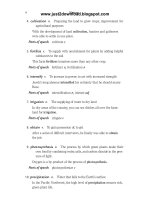Topic: Should children have homework?
Bạn đang xem bản rút gọn của tài liệu. Xem và tải ngay bản đầy đủ của tài liệu tại đây (158.59 KB, 20 trang )
Outline
Topic: Should children have homework?
I.
II.
Introduction
Children should not have homework for several reasons.
Body
*Argument:
1. Homework creates stress for children.
- Children are under a lot of stress to get homework done correctly and on time.
- Exercises in school often make children tired.
- Homework can cause conflict between parent and children.
2. Homework takes children a large amount of time which should be spent on relaxing.
- Children need spend time with their family.
- Children should be outside playing sports and enjoy some activities with friends.
* Counterargument and Refutation:
1. Counterargument: Doing homework is a good way to develop responsibilities.
2. Refutation: - Children end up copying off one another in attempt to finish all their
assignments.
- Homework creates bad habits.
III.
Conclusion:
Homework can do children harm.
1
Education is one the most important part in our country and plays a necessary role in our daily
life. Homework is a controversial topic of debate in education. Many people think that homework
is an indispensable part of school life. Doing homework is a good way to develop children's
responsibilities. However, others believe that teachers should not give homework for children
because of the following reasons.
The first reason is that homework creates stress for children. Along with the survey data from
4,317 students of 10 high schools in upper-middle-class California communities, Pope found that
fifty-six percent of the scholars regarded homework as a main reason of stress; forty-three percent
considered tests stressor, thirty-three percent of the students are under a lot of stress because of
getting good grades. Only less than one percent of the pupils claimed homework was not a stressor
(Parker C. B., 2014). Children are under a lot of stress to complete assignment correctly and
punctually. Children are afraid of teachers’ punishment if they do not finish homework which
teachers assign. Tending to do homework, they may stay up late at night and have to get up early
in the next day to study so they lack of sleep and can not focus on studying. Furthermore, activities
and exercises in school make children tired so children do not want to have homework after they
come back home. Due to shortened recess time, children at primary school are not likely to have
enough time to deal with what they have learnt. As a result from this pressure, children bring home
and accomplish homework which makes them feel more stressful (Cordz E. ). Moreover,
homework can cause conflict between children and their parents which is the reason why children
are constantly under pressure. Parents want the children to do homework so they meet resistance
from their kids; or parents are too busy to help children complete assignments while their children
can feel stressful. Many parents said that they are not ready for helping their children do
2
homework and that their children feel stressful when they try to support recurrently (Pickering,
2014).
Another reason is that homework takes children a large amount of time which should be
spent on relaxing. A research based on survey and students both showed the deficits of spending
too much time on homework which is the possible outcomes of the physical underdevelopment
and the cultivation of critical social life as well. If a student seems to be given many
assignments, he/she will be so overwhelmed that his/her engaged parts in family relationship or
friendship are easy to fade away (Parker C. B., 2014). Students spend most of their days at
school while parents are at work (Clifford, The Tyranny of Homework: 20 Reasons Why You
Shouldn’t Assign Homework Over The Holidays, 2012). After going home, children tend to
finish homework so they do not have time to talk with parents. . Family time is extremely
important to achievement, behavior and child development (Clifford, The Tyranny of
Homework: 20 Reasons Why You Shouldn’t Assign Homework Over The Holidays, 2012).
They need to spend time with their family to learn some things which are not taught in school. If
children do not have homework, relationship between children and parents becomes more closeknit. They can talk and solve the problem in their life as well as school together. Moreover,
children should go out and enjoy some activities with their friends to improve social
relationships. Many people said that children need between 6 to 7 hours a day of fresh air and
sunshine (Kravolec, 2014). Playing outside or participate in a sport is a good way to get them to
value physical activity (Clifford, The Tyranny of Homework: 20 Reasons Why You Shouldn’t
Assign Homework Over The Holidays). If they are free in the evening, they will have much time
to chat with friends and relax after a hard day. Children need a balanced life. “Children need
time to be children”.
3
Some people may think that doing homework is a good way to develop responsibilities for
children. Children have to finish their homework before going to school. They assigned their
homework today and they need to hand in it on the next day. It raises children's awareness about
their responsibility. This is partly true but homework can result in cheating. Going home after
school, some children may feel bored with homework, because they have study hard all day and
they do not want to complete their homework. They will start cheating: copying off one another
in attempt to finish their assignment. Otherwise, homework can create bad habits for children.
Homework does not help children to become hard worker, because the work is not self-directed
(Spencer, 2011). Children do not want to do homework, they start cheating, lying parents that
they have finished all the homework.
In conclusion, there is undoubtedly the potential harm to giving homework for children by
their teachers. Studies show that education should have extra-curricular activities and more
games as a subject instead of doing homework. Children are the future of countries so they need
to have good conditions to develop. Teachers should not have give homework to create stress for
children. Go out and enjoy the world. Play, sing and do not worry about homework.
(862 words)
4
REFERENCE
1. Clifford, M. (2012). The Tyranny of Homework: 20 Reasons Why You Shouldn’t Assign
Homework Over The Holidays. Retrieved from
/>2. Cordz, E. (n.d.). Does homework cause stress in children. Retrieved from
/>3. Kravolec, E. ( 2014). Should schools ban homework? Retrieved from
/>4. Parker, C. B. (2014, March 10). Stanford research shows pitfalls of homework. Retrieved
from />5. Pickering, R. J. (2014, March). Educational leader. Retrieved from
/>6. Spencer, J. (2011, September 19). Ten reasons to get rid of homework and five alternatives.
Retrieved from />
5
Stanford research shows pitfalls of homework.
By Clifton B. Parker
Stanford report, March 10, 2014
A Stanford researcher found that too much homework can negatively affect kids, especially
their lives away from school, where family, friends and activities matter.
"Our findings on the effects of homework challenge the traditional assumption that homework
is inherently good," wrote Denise Pope, a senior lecturer at the Stanford Graduate School of
Education and a co-author of a study published in the Journal of Experimental Education.
The researchers used survey data to examine perceptions about homework, student well-being
and behavioral engagement in a sample of 4,317 students from 10 high-performing high schools
in upper-middle-class California communities. Along with the survey data, Pope and her
colleagues used open-ended answers to explore the students' views on homework.
Median household income exceeded $90,000 in these communities, and 93 percent of the
students went on to college, either two-year or four-year.
Students in these schools average about 3.1 hours of homework each night.
"The findings address how current homework practices in privileged, high-performing schools
sustain students' advantage in competitive climates yet hinder learning, full engagement and
well-being," Pope wrote.
6
Pope and her colleagues found that too much homework can diminish its effectiveness and even
be counterproductive. They cite prior research indicating that homework benefits plateau at
about two hours per night, and that 90 minutes to two and a half hours is optimal for high
school.
Their study found that too much homework is associated with:
• Greater stress: 56 percent of the students considered homework a primary source of stress,
according to the survey data. Forty-three percent viewed tests as a primary stressor, while 33
percent put the pressure to get good grades in that category. Less than 1 percent of the students
said homework was not a stressor.
• Reductions in health: In their open-ended answers, many students said their homework load
led to sleep deprivation and other health problems. The researchers asked students whether they
experienced health issues such as headaches, exhaustion, sleep deprivation, weight loss and
stomach problems.
• Less time for friends, family and extracurricular pursuits: Both the survey data and student
responses indicate that spending too much time on homework meant that students were "not
meeting their developmental needs or cultivating other critical life skills," according to the
researchers. Students were more likely to drop activities, not see friends or family, and not
pursue hobbies they enjoy.
7
Does homework cause stress in children?
By Emily Cordz
Does Homework Cause Stress in Children?
Unfortunately, the answer to this question is yes. The age where homework starts to stress
children is becoming lower, some children even reporting concerning levels of stress due to
homework in early elementary school. There are many reasons for this trend, but one of the
most common one is the amount of information children are expected to learn is increasing in
complexity, and the rate they are expected to learn it is either remain the same or decreasing.
For elementary schools, the shortened recess time puts more pressure on children without
allowing them the time to work out their energy and digest what they have learned. This
increased pressure is brought home and makes completing homework assignments a difficult
task and very stressful for children.
Middle and high schools continue the tough academic pressures. Larger class sizes, shorter
break times and strong pressures to perform well on standardized tests all place students under
large amounts of stress. All of these factors make completing homework assignments a dubious
task. In this setting a student who has questions on various parts of the lesson will have a much
harder time getting that personal attention to answer their question, which in turn leads to hours
of frustration while trying to complete the homework assignment or an incomplete homework.
Educational leadership.
Robert J. Marzano and Debra J. Pickering
8
Parent Involvemen
Another question regarding homework is the extent to which schools should involve parents.
Some studies have reported minimal positive effects or even negative effects for parental
involvement. In addition, many parents report that they feel unprepared to help their children
with homework and that their efforts to help frequently cause stress (see Balli, 1998; Corno,
1996; Hoover-Dempsey, Bassler, & Burow, 1995; Perkins & Milgram, 1996). Epstein and
colleagues conducted a series of studies to identify the conditions under which parental
involvement enhances homework (Epstein, 2001; Epstein & Becker, 1982; Van Voorhis, 2003).
They recommended interactive homework in which
* Parents receive clear guidelines spelling out their role.
*Teachers do not expect parents to act as experts regarding content or to attempt to teach the
content.
* Parents ask questions that help students clarify and summarize what they have learned. Good
and Brophy (2003) provided the following recommendations regarding parent involvement:
Especially useful for parent-child relations purposes are assignments calling for students to
show or explain their written work or other products completed at school to their parents and get
their reactions (Epstein, 2001; Epstein, Simon, & Salinas, 1997) or to interview their parents to
develop information about parental experiences or opinions relating to topics studied in social
studies (Alleman & Brophy, 1998). Such assignments cause students and their parents or other
family members to become engaged in conversations that relate to the academic curriculum and
thus extend the students' learning. Furthermore, because these are likely to be genuine
9
conversations rather than more formally structured teaching/learning tasks, both parents and
children are likely to experience them as enjoyable rather than threatening. (p. 395)
The Tyranny of homework: 20 reasons why you shouldn't assign homework over the
holidays
Posted by Miriam Clifford
on Thursday, December 20, 2012
Here are 20 reasons why you shouldn’t assign homework over the holidays. Perhaps one of your
students will print this list and encourage you to reconsider your ideas about homework.
1.
Students are learning all the time in the 21st century. According to a recent article in
MindShift traditional homework will become obsolete in the next decade. Thanks to
computers, learning is occurring 24/7. With access to software programs, worldwide
connections, and learning websites such as the Khan Academy, learning occurs all the time.
According to Mindshift, “the next decade is going to see the traditional temporal boundaries
between home and school disappear.” Try to see if you can bridge the gap between school and
home by getting students interested in doing their own research over holiday break. Rather than
assigning homework, create a true interest in learning. They will often pursue learning about
topics they like on their own. After all, this is the way of the 21st century and information is
everywhere.
2.
More homework doesn’t necessarily equate to higher achievement. Yes, too much
homework can actually be a bad thing. A 1989 Duke University study that reviewed 120
10
studies found a weak link between achievement and homework at the elementary level and only
a moderate benefit at the middle school level. In a similar recent review of 60
studies, researchers at Duke U found homework was beneficial, but assigning excessive
amounts of homework was counterproductive. The research found homework was more
beneficial for older students than younger ones. The study was completed by Harris Cooper, a
leading homework research and author of “The Battle over Homework: Common Ground for
Administrators, Teachers, and Parents”. Cooper suggests that teachers at the younger level may
assign homework for improving study skills, rather than learning, explaining why many studies
concluded less benefit for younger children. Many teachers do not receive specific training on
homework. Cooper suggests that homework should be uncomplicated and short, involve
families, and engage student interests.
3.
Countries that assign more homework don’t outperform those with less
homework. Around the world, countries that assign more homework don’t see to perform any
better. A Stanford study found that in counties like Japan, Denmark, and the Czech Republic
little homework was assigned and students outperformed students in counties with large
amounts of homework such as Greece, Thailand, and Iran. American and British students seem
to have more homework than most counties, and still only score in the international average. In
fact, Japan has instituted no homework policies at younger levels to allow family time and
personal interests. Finland, a national leader in international tests, limits high school homework
to half hour per night. Of course, there are other factors not taken into account in the study,
such as length of the school day. But in itself, it is interesting to see this issue from a world
perspective.
11
Instead of assigning homework, suggest they read for fun. There are great holiday
4.
stories and books you can recommend to parents and students. If you approach the activity with
a holiday spirit, many students will be engaged. They may want to check out the stories on their
own. You can start by reading the first chapter in class and leaving them intrigued. For
instance, you can read the first chapter of The Gift of the Magi and suggest students read it over
winter break. With younger students, you might promise roles in a play for students who read
over break.
Don’t assign holiday busy work. Most academics agree that busy work does little to
5.
increase learning. It is best to not assign packets of worksheets if they do nothing to add to
student learning. You also don’t want to waste valuable time grading meaningless paperwork.
Some studies show that much homework may actually decline achievement. Assigning
excessive amounts of homework may be detrimental. In fact, a 2006 study by
Yankelovick found that reading achievement declined when students were assigned too much
homework. Actually, interesting reading such as Harry Potter produced higher reading
achievement.
Have students attend a local cultural event. You can let parents know that instead of
6.
assigning homework, you are suggesting students attend a particular event that relates to your
classroom. For instance, if you are reading Shakespeare, they might attend a related play or
ballet.
7.
Family time is more important during the holidays. Assigning less homework makes
it easier for families to have time together. Family studies at the University of Michigan, show
that family time is extremely important to achievement and behavior. Studies on family meals,
suggest that students who have dinner with their family have better academic scores and
12
behavioral outcomes. Perhaps this is only a correlation, but family time is undeniably important
to child development. Students spent most of their days at school while parents are at work.
When all is said and done, remember what it was like being a kid. The things you remember
most about the holidays aren’t the assignments you took home, but the time you spend with
family and friends.
8.
For students who travel during the holidays, homework may impede learning on
their trip. The Holiday time is the one time of year that many families reconnect with distant
family members or travel. I remember having to pack hoards of books over some holidays to
Spain and it was not fun. I wanted to enjoy the time with family and experience the country
fully. Traveling in itself is a learning activity. Let students experience their travels fully.
9.
Kids need time to be kids. A recent article from Australia’s Happy Child
website, “What is the value of Homework: Research and Reality” considers this issue and
explains how children need unstructured play time. Homework can have a negative influence
on early learning experiences. Suggest students use holiday time to do physical activity, such as
ice-skating or sledding. Many kids don’t get enough exercise. Childhood obesity is a major
problem in the United States. Suggesting students play outside or participate in a sport is a
good way to get them to value physical activity. The holidays are a great time for kids to go
sledding in the snow or play with friends outside. If no one has homework, classmates might
exchange phone numbers to play together. You can suggest this to parents.
If the teacher
thinks physical activity is important, students will too.
10.
Some education experts recommend an end to all homework. Etta Kralovec and
John Buell, authors of The End of Homework: How Homework Disrupts Families,
Overburdens Children, and Limits Learning, controversially suggests that homework may be a
13
form of intrusion on family life, and may increase the drop-out rate in high schools. The
authors blame homework for increasing the achievement gap due to socio-economic differences
in after-school obligations. Consider challenging your own views of the benefits of homework
and try to create a level playing field when considering assignments.
11.
Send a letter to parents explaining why you are not assigning work. You might
want to take the Christmas holiday as a chance to engage parents to play a learning game or do
some art with their kids. If families know there is an intentional purpose to not assigning work,
they may take the chance to spend more one-on-one time with their child.
12.
You can make the holidays a time for an “open project” for extra credit. Students
might take this time to do something related to the curriculum that they would like to explore on
their own terms. Before the holidays, you might talk about topics or provide books students for
students to take home. Learning for fun and interest, might produce more meaningful
engagement than assigned homework.
13.
Suggest they visit a museum instead. With families at home, the holiday time is a
great time for students to see an exhibit that interests them or do a fun activity at a nearby
museum. Sometimes encouraging these field trips may be more beneficial than assigning
homework. You might want to print coupons, a schedule, or a list of upcoming exhibits so that
families have the information at their fingertips.
14.
Encourage students to volunteer during the holiday time. The holidays are a great
time for students to give back. Students might volunteer at a local soup kitchen or pantry.
Volunteer organizations are often at their busiest during the holiday time. Plus, students learn a
lot from the experience of doing community service. I remember visiting a group home during
the holiday time in high school and helping kids wrap Christmas gifts for their families. This is
14
a great alternative to assigning homework, especially for Generation Y who highly values civic
involvement.
15.
Develop a class game. You might have the class play a learning game the week before
vacation and have them take it home to show their family. My fourth grade teacher had hopscotch math. We often drew with chalk outside to replicate her game at home. Try to think of a
holiday-themed game or one that the whole family can get involved in.
16.
Students might learn more from observing the real world. Learning isn’t just about
paper and pencil activities. Teachers should also inspire students to seek ways to learn from
real-world experiences. They might cook with their parents and practice measuring. Or tag
along with a parent who is putting up holiday lights or building a shed. Ask students to observe
a job around the house or ask their parents about their job over holiday break. They might be
enlightened to learn more about the real world and different jobs they might pursue in the
future. Perhaps some students might be able to go to work with their parents instead of a formal
assignment.
17.
Go on a hike. Students learn a great deal from nature. Tell students to go outside on a
walk and be ready to share their experience when they get back. Did they observe natural
phenomena you talked about in science class or different types of rocks you discussed in
geology? Or can you tie their walk into a discussion of poetry?
18.
Tell students to visit an amusement park. If you are teaching physics or math,
amusement parks give ample room to explain the laws of physics and mathematical probability.
This outing would allow students to think about the real world implications of science. You
may want to even plan a lesson beforehand that ties this idea in. On another level, it allows
students to create a lasting memory with their own families.
15
19.
Kids need rest! Everyone needs a mental breather and the holidays are the best time for
students to play and take a break from school. Kids need a full ten hours of sleep and adequate
rest. The vacation time is a great time for students to take a mental breather from school. With
many family outings and vacations during the holiday time, they will have less time to complete
homework. They will come back to school feeling re-energized.
20.
Many parents and students dislike holiday homework. You want parents to buy-in to
your classroom community and support your endeavors with students. Assigning holiday
homework is usually unpopular with parents because it may the one time of year they have to
give children their undivided attention. Instead, you might want to take a survey to see if
parents agree with the idea. You can then send a letter with the survey results. Taking parents’
perspectives into account shows you value their opinions and feedback. Students prefer some
free time too. Not surprisingly one student created a Facebook page, titled, “Why do teachers
give us homework over the holiday.” If the students know you are giving them a break over
the holidays they may work harder for you when they get back.
Ten reasons to get rid of homework (and five alternatives)
By John Spencer
Homework Teaches Bad Work Habits: I know this sounds crazy, because it’s precisely the
reason that so many people give for offering homework. However, homework doesn’t teach
good study habits. It teaches kids to study, because they have to rather than need to. Similarly,
homework doesn’t help children become hard workers, because the work is not self-directed.
Want to watch a child work hard and take ownership of learning? Watch a child build a bridge
16
for fun. Let a child read a book for fun (without the bribery of fried dough) and see just how
hard a kid will work when there is a meaningful goal. Hard work is a product of motivation. It is
an internal drive. When we a parent steps in an makes a child work hard, the work ethic
diminishes.
Should schools ban homework?
By Etta kravolec
With a new school year starting, homework is front and center in many homes. Parents worry if
their kids are completing the assigned work while kids wonder why they have to work when
really they prefer to play in the sun.
There's good news for some families in Quebec.
The College de Saint-Ambroise, an elementary school in Quebec, has banned homework for
kids in grade one through six for a year. The Canadian media exploded with blogs, tweets and
radio talk shows questioning the decision or applauding the action.
Attempts to ban homework aren't new. In 2012, President Francoise Hollande of France
proposed banning homework for all primary and middle school students, which was
roundly ridiculed by The Wall Street Journal. In the same year, a school in Germany decided to
actually do away with homework for students in grades five to nine.
Oddly, when schools decide to ban homework, it is big news, but we know little about what
happens afterward. What we do know is that Finland assigns little homeworkand its students
have some of the highest test scores in the world.
17
Los Angeles Unified School District -- America's second-largest school system -- took a
different tact.
In 2011, it set a policy that homework could not count for more than 10% of a student's grade.
The decision caused such an outrage that a 15-member panel was formed and subsequently
changed the policy so that homework accounted for 20% of a student's grade.
This kind of intense debate about homework has a long history. For example, in the 1920s,
some physicians were concerned about the impact of homework on children's health.
They argued that children need between six to seven hours a day of fresh air and sunshine. In
the 1930s, editor Edward Bok of the Ladies Home Journal also called for an end to the practice.
For the rest of the 20th century, different research reports were used to support or dismiss the
practice, yet it persists despite the lack of clarity on its educational value.
What is clear is that parents and kids don't live in the world of academic research; they live in
the real world where there are piles of homework on the kitchen table.
The experience of homework is very different depending on which side of the economic divide
you sit. The unequal distribution of educational resources means that some students go home to
nannies, well-stocked home libraries, tutors, well-educated parents and high-speed Internet.
Others students go home to caring for siblings in crowded apartments and often-absent parents
who barely make ends meet. The issue of inequality was a main reason that the French President
proposed banning homework.
What about parents' educational hopes for their kids?
Homework forces families to follow the state's educational agenda. Most parents are willing to
turn their kids over to the state for the seven to nine hours of the school day for educational
enrichment. But then they want to build a rich family life with their kids, and homework can
18
interfere with that. For example, if parents want their children to be actively engaged with
grandparents or church activities in the evening, those things would compete with homework
time.
Who controls a child's time has tremendous implications for the debate on homework. Should
children be in school nine hours only to come home to two hours of homework? Could the
intense pressure on children to achieve academically have negative health impacts down the
road, in addition to the increased childhood obesity we are seeing?
When schools ratchet up the pressure for higher academic achievement, one of the first things to
go is recess even as homework is piled on.
While scholars debate the value of homework -- and pundits, politicians and educators call for
increased educational choices, greater standardization and accountability for schools -- many
parents and students feel overwhelmed. The pressure of longer school days and more homework
don't help matters.
Parents who want to connect personally in meaningful ways with their children after a long day
at their job would do well to remember that they have a right to family time uninterrupted by
homework. They would do well to listen to what their kids have to say about the impact of
homework on their lives.
Too much homework may not be a good thing, especially for younger children. For families
interested in clearing the kitchen table they can find support and advice from the
growing Healthy Homework movement.
At the end of the day, it's about how one wants to balance work, family, educational goals and
happiness.
19
20









